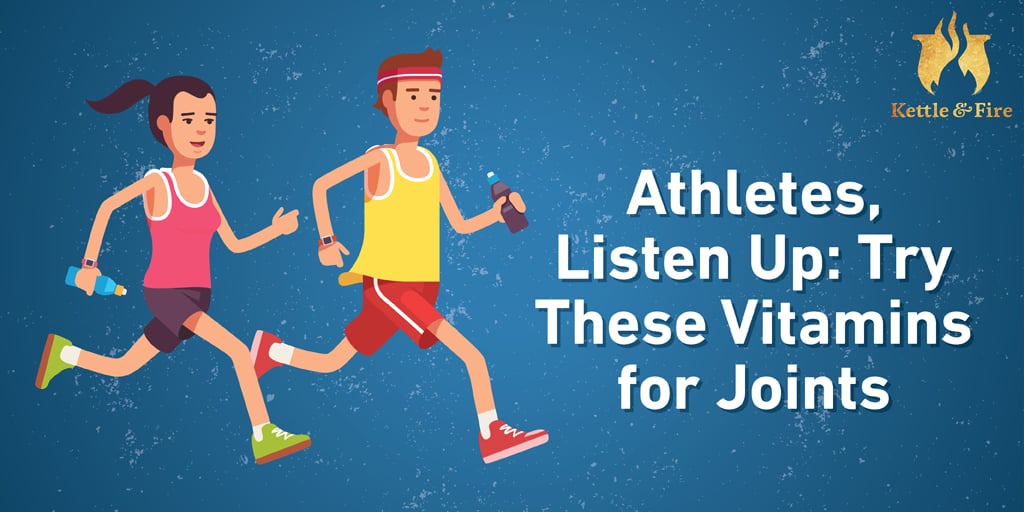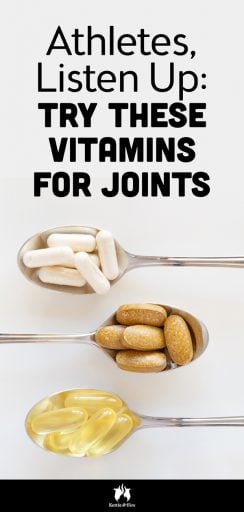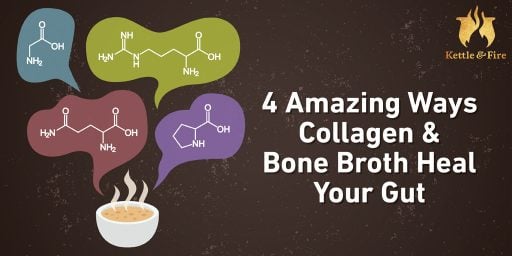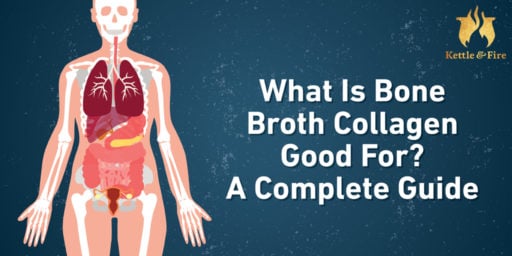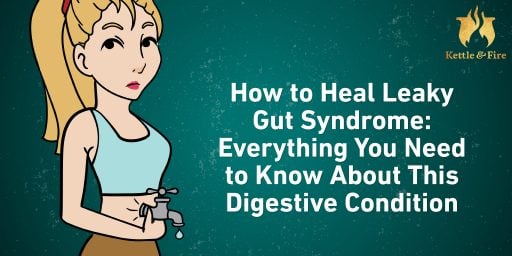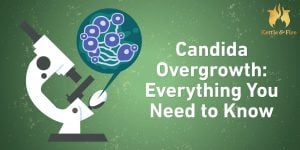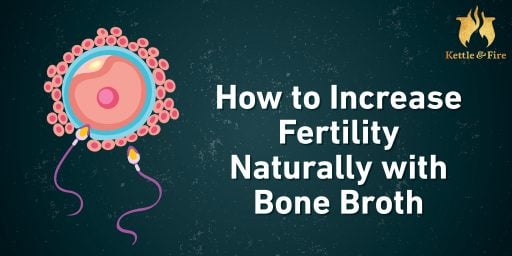Athletes, Listen Up: Try These Vitamins for Joints
If you’re logging on the miles or hitting the weights but feel constant pain in your joints, a vitamin deficiency could be to blame.
As we age, it gets more and more difficult to recover from workouts and maintain the same fitness regimen we followed when we were younger. But here’s the good news: adding supplemental nutrients to your workout recovery plan is a safe —and affordable — way to promote joint health.
You can read about common supplements and vitamins for joints like omega–3 fatty acids, fish oil and chondroitin sulfate in this post. But there are so many other nutrients that your joints need to say strong and healthy.
Below, we’ll given you a crash course in the basics of supplemental vitamins, and how to understand their effects on your body. Then we’ll break down the best vitamins for joints to keep you in the gym for life, wear off soreness and keep joint pain at bay.
A Few Things to Know About Vitamins For Joints (and In General)
What’s a water-soluble vitamin, anyway? How is it different than a fat-soluble vitamin? Is it true you shouldn’t take a multivitamin? And what does “essential” even mean?
All great questions. Here’s what you should know.
Fat Soluble vs. Water Soluble
There are two different kind of vitamins: fat soluble and water soluble. There are benefits and drawbacks to each.
Fat-soluble vitamins (A, D, E and K) get stored in your fat stores (1). This is good, because they’re there when you need them. Water-soluble vitamins (B and C) are not stored, and therefore you need to replenish them daily (2).
So, what’s the drawback of fat-soluble vitamins? Since they’re stored by your body, it’s possible to consume too much. Supplementing with with fat-soluble vitamins could lead to toxicity, while excess water-soluble vitamins are excreted by the body.
Essential vs. Non-Essential
What vitamins are essential? This is a trick question — all vitamins are considered essential nutrients, because your body can’t produce them on its own. Vitamin D is the one rare case, which can be produced through sun exposure (3).
Are Multivitamins Good or Bad?
That has yet to be decided, as there’s conflicting research on the subject. A balanced diet should provide you with the vitamins you need, but a multivitamin is an easy way to “fill in the cracks.” However, taking a generic multivitamin (particularly those with 100 percent of your daily allowance of each) can give you too much of one nutrient — such as iron, vitamin A, zinc and folic acid (4).
Now that you know the basics on vitamins, here are a few you might want to supplement with.
Vitamin E
What Does Vitamin E Do?
Vitamin E is a fat-soluble vitamin found in many foods. It’s been shown to benefit your vision, reproductive hormones, blood, brain and skin (5). You can find vitamin E in green leafy vegetables, olives, blueberries, tomatoes, avocados and most nuts and seeds.
Vitamin E is known primarily for its antioxidant properties. Antioxidants help protect against free radicals, which damage cells and could be related to the development of cancer and other diseases (6)(7).
How Can Vitamin E Provide Joint Support?
Studies have shown vitamin E could help reduce swelling and inflammation and prevent osteoarthritis. Osteoarthritis results in joint damage by breaking down the cartilage surrounding your joints.
There are several treatments, but most just treat the symptoms — they don’t actually slow or prevent it. Vitamin E, on the other hand, has been shown to both reduce the pain and slow the progression of the disease (8).
In another study, researchers thought the antioxidant properties of vitamin E could help treat patients with rheumatoid arthritis. While there didn’t seem to be any effect on arthritis symptoms, it did prevent the breakdown of joints (9).
Vitamin C
What Does Vitamin C Do?
Vitamin C is a water-soluble vitamin found in many fruits and vegetables. Vitamin C is an essential vitamin, meaning your body cannot produce it on its own. It plays an essential role in immune function, helps your body absorb iron and prevents against various diseases (6).
Like vitamin E, vitamin C is a strong antioxidant. Studies have shown that consuming vitamin C can boost your body’s antioxidant levels, helping to fight against inflammation (7).
How Can Vitamin C Help Your Fitness Routine?
Have you ever heard of sports anemia? Iron deficiency anemia is the leading nutrition deficiency, and is very common common in athletes — particularly runners (8)(9). Someone who has iron deficiency anemia will feel out of breath doing something as simple as climbing a flight of stairs — even if they’re in fantastic shape. This is because your body needs iron to produce hemoglobin and red blood cells, which are responsible for carrying oxygen to your lungs (9).
So what does vitamin C have to do with anemia? If you have iron deficiency anemia and iron supplements don’t seem to help, try supplementing with vitamin C, as it can help your body absorb iron.
Vitamin B12
What Does Vitamin B12 Do?
Vitamin B12 keeps your nerve and blood cells healthy. It helps your nervous system, digestion, brain function and cell formation. If you’re not getting enough B12, you might feel fatigue, weakness or like you have constant brain fog (11).
If you’re an athlete who follows a vegetarian or vegan diet, you might benefit from supplementing with B12. Vitamin B12 is only found naturally in animal-based foods like meat, liver, eggs and dairy products. You won’t find it in plants, only processed foods like fortified cereals.
How Can Vitamin B12 Benefit Your Muscles and Joints?
Low levels of vitamin B12 can lead to nerve damage, causing tingling and numbness in your hands and feet and muscle weakness (12). Some athletes, particularly runners, have reported being sidelined from their sports due to a vitamin B12 deficiency.
New research shows that vitamin B12 may be associated with bone density. In one study, men and women were measured for bone density and vitamin B12. Those low in one were shown to have to have low levels in the other (13). Low bone density is one of the greatest warning signs of osteoporosis. By maintaining healthy bones, you are more likely to maintain healthy joints and connective tissues.
Vitamin D
What Does Vitamin D Do?
Vitamin D is a fat-soluble vitamin which can be obtained through food, supplements or sun exposure. Vitamin D helps promote cell growth, immune function and reduce joint inflammation.
Vitamin D also helps your body absorb calcium. Without it, your bones might become thin and brittle, or you may eventually develop osteoporosis (14).
How Can Vitamin D Cure Joint Pain?
A lack of vitamin D has been related to joint pain in several studies. In adults, vitamin D deficiency has been shown to worsen pain in the hips and knee joints over time (15). In another, patients experienced pain relief when they took vitamin D supplements (16).
Research also shows a link between vitamin D deficiency and chronic pain. While vitamin D supplementation hasn’t been proven as a treatment for chronic pain, it’s a relatively inexpensive, safe treatment (17).
Can Vitamins Help Reduce Joint and Muscle Pain?
Multiple studies have shown supplementing with vitamins can help reduce joint pain and inflammation, treat chronic pain and prevent muscle fatigue. Vitamins are an essential nutrient, meaning you must consume them from foods or supplements.
Vitamins E, B12, C and D in particular have been shown to help reduce and slow pain related to aging, fitness, anemia, osteoarthritis and rheumatoid arthritis pain.
Before starting to supplement with vitamins, ensure that you do have a deficiency. Too much of one vitamin — particularly fat-soluble vitamins — can be toxic. If you do have a deficiency, vitamins are an inexpensive way to treat pain and spare your joints and muscles from wear related to workouts and aging.
Pin this post for later:

